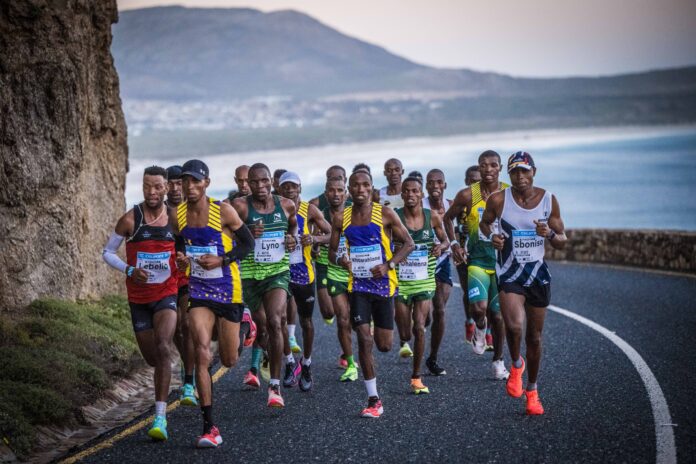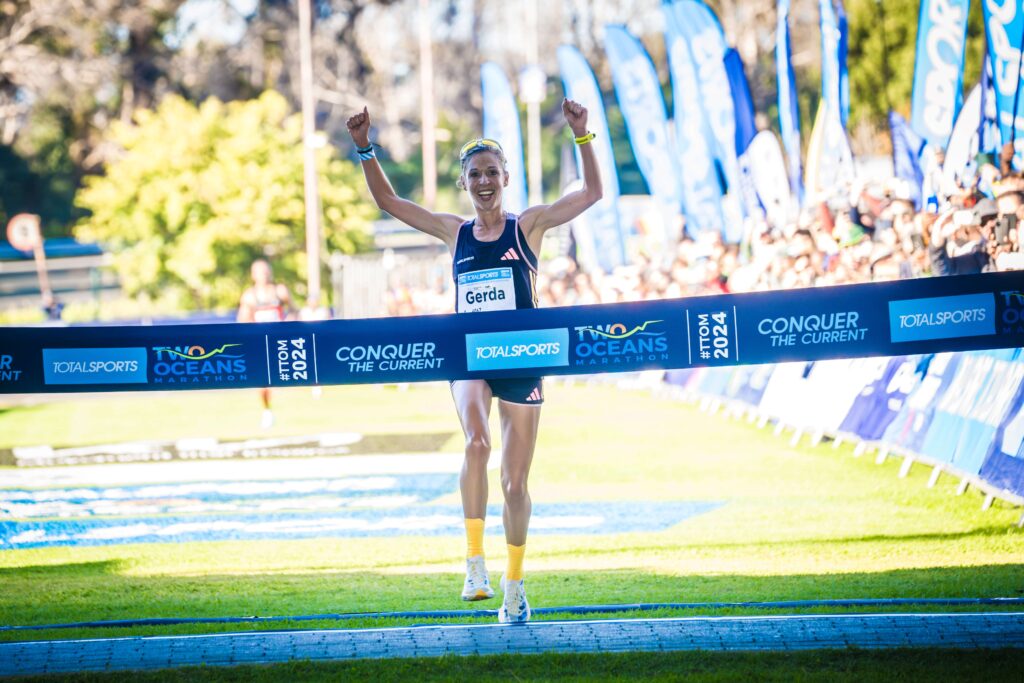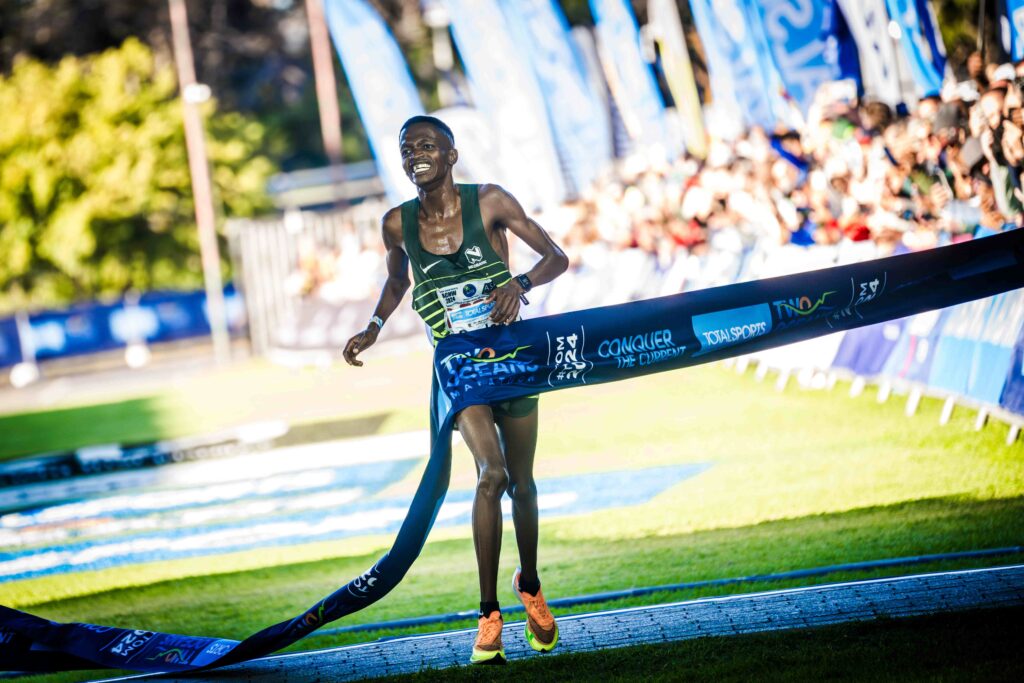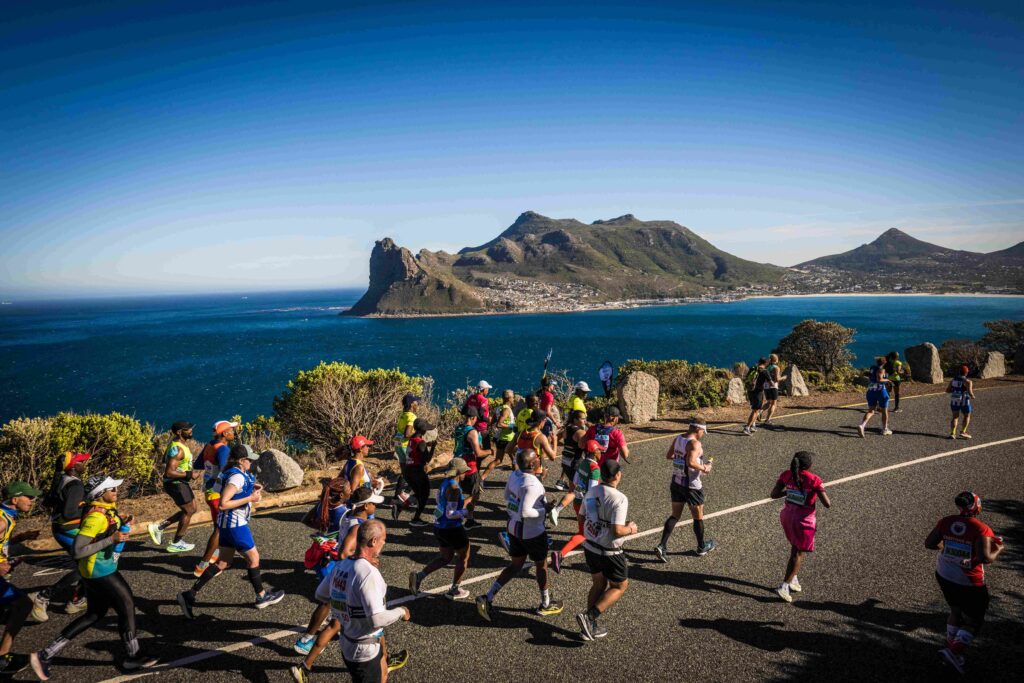
This year’s Totalsports Two Oceans Marathon, which took place in Cape Town recently, produced intense road-running competition and delivered one of the best-ever races since the Two Oceans’ inception in 1970.
It will be remembered for a once-in-a-generation athlete with apparent super-powers in the women’s contest and one of the most endearing characters and promising talents in the men’s.

If there was ever a doubt about Gerda Steyn’s status in global ultra-marathon stakes, the manner and outcome of her victory last weekend in a record-breaking 3 hrs 26 min 54 sec would have dispelled that. Steyn is unrivalled in world ultra-distance racing on the road and her next career moves will be watched with interest.
In the short term, there is the prospect of a strong Olympic Marathon on a challenging course in Paris in August. Future stellar ultra-distance performances might even include a flirtation with a high-profile ultra-trail race in Europe.
Steyn’s race was characterised by a number of plus points to savour – her professional preparation, her focus on Two Oceans in a race in itself, her race strategy and its perfect application, her apparent race-long enjoyment of her time on the course, her gratitude to those who have supported her along the way and her generosity in sharing her running joy with family, friends and fans alike.
Steyn’s 2 min 11 sec improvement on her own record is impressive, but a closer examination of her race suggests that South Africa’s ‘golden girl’ of the marathon is not yet finished with the Two Oceans. It is not too far a stretch to suggest the 3 hr 20 min mark could be threatened before the former Free Stater is done with Oceans.
And given her steady year on year improvement in both speed and endurance in recent years, the application of an ‘Oceans Algorithm’ (which converts a Two Oceans best to a fastest standard marathon) to Steyn’s Two Oceans’ potential points to the possibility of a marathon time close to 2 hrs 20 min within the next two to three years.

And what can one say of Onalenna Khonkhobe, a young man in only his second Two Oceans Ultra-marathon with a modest marathon best of 2 hrs 22 min, who boldly proclaimed on race day minus one that the cameras will be on him at the end of the race?
Talk is cheap. But to deliver on such boldness takes a special athlete. Undoubtedly, we will see more of Khonkhobe, who took the lead this year exactly where he lost it two years ago, on the descent to Kirstenbosch in the 51st kilometre. Although his Nedbank teammate, Lloyd Bosman, came close it was clear Khonkhobe was never going to surrender and he won by 28 seconds in 3:09:30, within 50 seconds of the fastest time recorded in the past decade.
If Khonkhobe’s run was a minor surprise – his team management appeared convinced he would win – Bosman’s performance was more startling. Coincidentally, Bosman’s marathon best is identical to that of Khonkhobe’s, his 2:22:25 set in winning this year’s Peninsula Marathon on a windy day in Cape Town, but while Khonkhobe’s 2022 run at Two Oceans promised more from the Klerksdorp-based athlete, Bosman’s 3:16:10 for 12th position last year had not had the same impact.
Bosman, who hails from the Southern Cape city of George, looked a probable winner as he surged into the lead shortly before 49km and was well clear of his rivals at Kirstenbosch top gate a kilometre further on. But Khonkhobe’s pace on the descent proved decisive as he closed the gap with startling speed before racing clear to victory in 3:09:30.
More will certainly be heard from Khonkhobe and Bosman, but just how fast might they go in a standard marathon? An application of the Oceans Algorithm suggests their improvement will be substantial and a 2:12 to 2:13 marathon can be expected from them in the near future.
A feature of this year’s Two Oceans was the outstanding competitiveness in both the men’s and women’s 56km races. Seldom, if ever, have so many still been in contention to win so close to the finish, with the race lead having changed hands on no fewer than eight occasions.
Eleven seconds separated the top three, Bosman, Khonkhobe and Lesotho’s Khoarahlane Seutloali, through 50km, with the sixth athlete, Malawian Mphatso Madolo, just 33 seconds behind the leader. The ninth runner through the mark, South African Pule Sibeko, was still in contention a further 43 seconds back.
The women’s contest was equally absorbing, characterised by Steyn’s bold opening gambit as she ran with the men’s elite through 5 km, Irvette van Zyl’s fall and fierce fight-back, a courageous run by Zimbabwean Loveness Madziva who was still running at Steyn and Van Zyl’s heels through half way, and the strong international flavour of the race. Four South Africans, two British, and one each from Zimbabwe, USA and Ireland filled the top ten gold medal positions.

The weather gods smiled on this year’s Two Oceans, and for the vast majority of close to 26 000 competitors in the ultra and half marathons the event lived up to its promise and expectations as one of the continent’s finest ultra-marathons. No grumbles or complaints were to be heard among the club gazebos which were pitched on Middle Campus sports field at the Oval, indicative of a successful event.
“This year’s Totalsports Two Oceans Marathon was a fantastic event & celebration of running. Watching Gerda take another record-breaking win, was amazing to watch & be part of,” said Jonathan Stein, Head of Business at Totalsports. “Congratulations to every runner who took to the start of what can only be described as the most beautiful race.”
Nonetheless, incidents are inevitable in an event as substantial as the Two Oceans and the team have already committed to work on every aspect to ensure an even better delivery next year.
The Two Oceans team and the City of Cape Town authorities would do well to find a formula to allow for a later start to both races. One of the strongest selling points of the Two Oceans is its spectacular scenic beauty. But with the leaders passing potential glamour points, such as Muizenberg, Kalk Bay and Fish Hoek in the dark, the selling power of Cape Town’s natural beauty was short-changed. Even Chapman’s Peak was reached well before sunrise.
The depth of quality in the half marathon was not as impressive as in past years and is linked to the always challenging issue of live television coverage. Potentially, switching the Half Marathon to the Saturday and holding the ultra-marathon on the Sunday as the weekend climax could help to address this.
But taken as a whole, the organisers delivered an event of which Capetonians can be proud, ploughing close to R1 billion into the regional economy.


